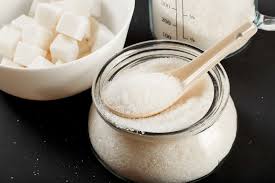 Also known as D-allulose and D-Psicose, with the chemical formula C6H12O6, allulose is a low-calorie artificial sweetener. Although allulose was discovered way back in 1940s, its commercial production and use has started in recent years. It is expected that allulose will become more commonly available in the coming years and will be among the next-gen artificial sweeteners. As of now, allulose is being used by commercial food and beverage companies.
Also known as D-allulose and D-Psicose, with the chemical formula C6H12O6, allulose is a low-calorie artificial sweetener. Although allulose was discovered way back in 1940s, its commercial production and use has started in recent years. It is expected that allulose will become more commonly available in the coming years and will be among the next-gen artificial sweeteners. As of now, allulose is being used by commercial food and beverage companies.
What makes allulose special?
There are several qualities that make allulose better than other artificial sweeteners. Some of these are given below.
Same taste as natural sugar – Most currently available artificial sweeteners such as sucralose and aspartame are known for their high-intensity sweetness. These often leave an after-taste in the mouth. Allulose is different, as its sweetness is around 70% of sweetness of sucrose. This is why it has almost the same taste and flavor as that of table sugar. Technically, allulose belongs to the monosaccharide category.
Fewer calories – Allulose has just around one-tenth of the calories found in table sugar. This makes it a good option for people looking to reduce weight. Other sweeteners may have even fewer calories, but their overall taste does not match that of table sugar. Allulose has provided a balance of taste and low calories.
Derived from nature – Allulose is naturally present in certain food items such as wheat, figs, raisins, and jackfruit. For commercial production, allulose can be derived from fructose. This is an easy process, which has enabled mass production of allulose.
Safe for diabetics – Allulose is readily absorbed by the body, but very little of it is actually metabolized by the body. Most of it is eliminated via urine without getting converted into fuel. Research studies have shown that allulose does not raise blood sugar levels. Moreover, its glycemic index is extremely low or almost negligible. All these factors make allulose a safe bet for diabetics.
May boost fat loss – In research experiments conducted on lab rats, it has shown that allulose reduced fat accumulation in rats. This was in comparison with other sugars such as sucrose and erythritol. In other similar studies, lab rats fed with allulose were found to be burning fat at a higher rate. Tests on humans are expected to be conducted in the near future.
Last but not least, allulose has been classified as safe by the US Food and Drug Administration. It is included in the list of foods ‘Generally Recognized as Safe’ (GRAS). Extensive testing on rats has not shown any signs of toxicity or other health issues. In humans, dose of around 1-3 teaspoons per day for up to three months did not show any negative side effects. Allulose is considered safe for now and could become the artificial sweetener of choice in the future.
 Newspatrolling.com News cum Content Syndication Portal Online
Newspatrolling.com News cum Content Syndication Portal Online





